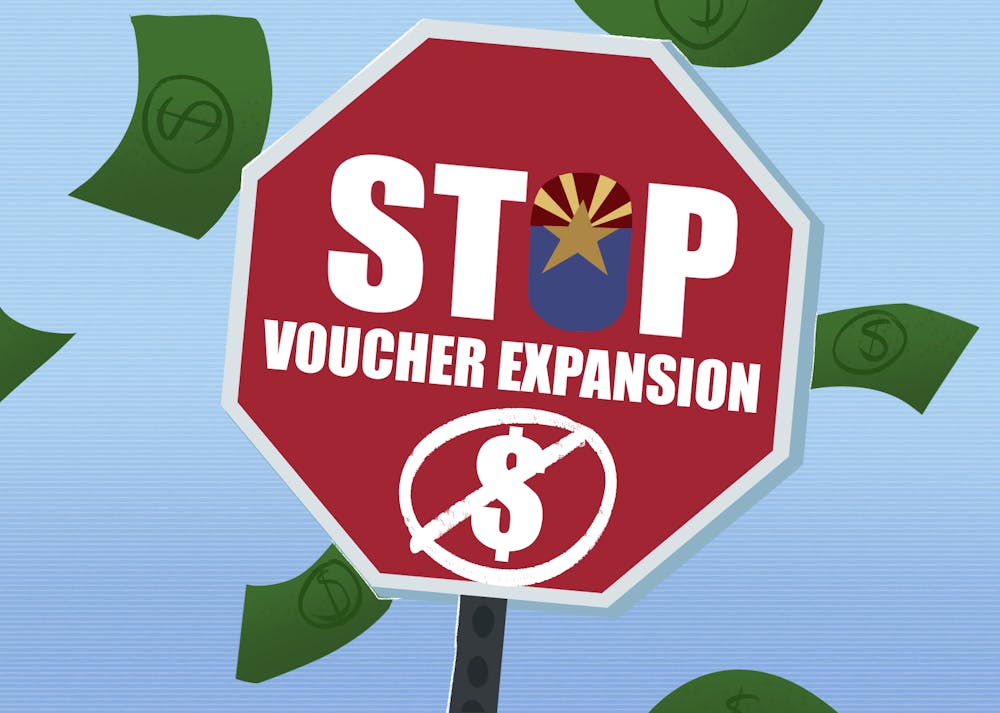An Arizona school voucher expansion bill has recently gone into effect after the petition set out to contest it didn't receive enough signatures for a referendum.
This move is yet another heavy blow to Arizona's struggling public school system. Worse than that, it's now a reflection of how Arizona lawmakers are restricting democratic processes in their efforts to undermine public education.
For context, this isn't the first time expanding school vouchers has been on the table for Arizona.
Jeanne Powers, a professor in the Mary Lou Fulton Teachers College specializing in school choice and segregation, said Arizona has a long-standing commitment to school vouchers. She brought up Proposition 305, a similar proposed school voucher expansion backed by Republicans in 2017.
"Voters overwhelmingly rejected it," Powers said.
Opposition to the recent school voucher expansion legislation has also been strong. While the petition received 141,714 signatures, only 88,866 were valid, falling short of the 118,823 minimum requirement.
Powers believes the Arizona Legislature's decision to cut the allocated time for petitioners to gather signatures from 90 to 80 days played a big role in the petition's failure.
"When you change the playing field, it's kind of like voting restrictions," Powers said. "You need to understand this policy within its broader context."
The "broader context" Powers referred to is this year's ballot. In Arizona alone, there are three proposed restrictions on referendums, measures that enable a direct vote by the electorate on an issue, law or proposal.
This form of "direct democracy" has recently led to expansions of liberal policies like Medicaid in Maine, Idaho, Missouri, Nebraska, Oklahoma and Utah. This seemingly encouraged Republican-held legislatures to try to restrict referendums, a troubling trend reflected in Arizona's controversial school voucher debate.
"There's a difference between legislators' commitment to schools and voters' commitment to schools," Powers said. "I think that's what you see with the success of the referendum campaign when things are taken directly to voters."
According to Powers, this fundamental disconnect between parents' and legislators' priorities contributes to Arizona having one of the worst and most underfunded school systems in the country— and Arizona's school voucher expansion will likely depress funding even further.
This is because school vouchers divest funding from public schools by making taxpayer money additionally subsidize private school tuition. In public schools, this leads to increased class sizes and fewer resources, such as decreased school counselors and nurses, textbooks, equipment and cutting music and athletic programs.
Arizona's parents historically don't support school voucher expansion, and yet this bill has made it into law. Again, this is likely due to Gov. Doug Ducey reducing the time window for petition signatures, and the Arizona GOP's active efforts to undermine referendums.
Since referendums are the most direct way we have a voice in the democratic process, this infringement is serious. Not only are Arizona Republican lawmakers turning their backs on public schools, but they're turning their backs on their constituents.
Over 1.1 million students rely on Arizona public schools, and we need to do everything in our power as Arizona voters and students to make sure that they're represented in November.
Edited by Sadie Buggle, Piper Hansen and Kristen Apolline Castillo.
Reach the columnist at mosmonbe@asu.edu.
Editor's note: The opinions presented in this column are the author's and do not imply any endorsement from The State Press or its editors.
Want to join the conversation? Send an email to opiniondesk.statepress@gmail.com. Keep letters under 500 words and be sure to include your university affiliation. Anonymity will not be granted.
Like The State Press on Facebook and follow @statepress on Twitter.




